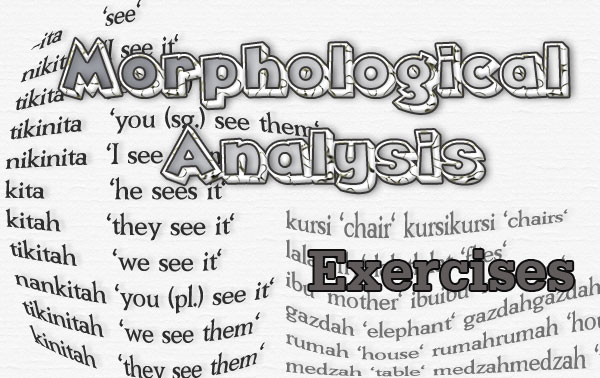English morphology exercises about: constituent morphemes, free and bound morphemes, inflectional and derivational affixes, compound words, syntactic category, word root and stem, suffixes and prefixes.
Exercise 1 (From studylib.net) Answers
a) Divide the following words into their constituent morphemes by placing a plus sign (+) between the morphemes, and indicate for each morpheme whether it is bound or free:
Cleaning lady, anti-skidding device, mushroom, nationhood, deputise, derailments, predestination and internationalization.
b) A number of morphemes in the following passage are italicized. For each, say
whether it is bound or free; if bound, whether it is an inflection or a derivational affix.
We are at once the most resilient, most resourceful, most restive, most receptive, most radical, most reactionary people who ever lived. We have had time and the tide for everything but those moments of thought necessary to reverse the priorities to cause us occasionally to look before leaping.
Exercise 2 (From studylib.net) Answers
Study the following passage and then answer the questions below. Take your examples from the passage. You may need a brief look at affixes rules.
"The dogs swam ahead, fatuously important; the foals, nodding solemnly, swayed along behind up to their necks: sunlight sparkled on the calm water, which further own stream where the river narrowed broke into furious little waves, swirling and eddying close inshore against black rocks, giving an effect of wildness, almost of rapids; low over their heads an ecstatic lightning of strange birds manoeuvred, looping-the-loop and immelmanning at unbelievable speed, aerobatic as new-born dragonflies. The opposite shore was thickly wooded."
Malcom Lowry, Under the Volcano
(immelmanning – (n) an aircraft manoeuvre used to gain height while reversing the direction of flight. It consists of a halfloop followed by a half roll.)
a) Identify 3 compound words. For each one, name the grammatical category of the compound, and the grammatical category of the elements that compose it.
(Example: watertight is an adjective, made up of noun + adjective.)
b) Divide the following words into their component morphemes, labelling each morpheme F (free), I (inflectional), or D (derivational):
unbelievable, dragonflies
c) What is the function of the suffix –ly in the words fatuously, solemnly, and thickly?
d) Identify two other words containing (different) derivational suffixes, name the grammatical category of the stem to which the suffix is attached, and the grammatical category of the derived word.
e) Describe the function of the suffix –s in foals and waves, and that of the suffix -ed in swayed and sparkled.
f) Comment on the past tense forms swam and broke.
(Example: watertight is an adjective, made up of noun + adjective.)
b) Divide the following words into their component morphemes, labelling each morpheme F (free), I (inflectional), or D (derivational):
unbelievable, dragonflies
c) What is the function of the suffix –ly in the words fatuously, solemnly, and thickly?
d) Identify two other words containing (different) derivational suffixes, name the grammatical category of the stem to which the suffix is attached, and the grammatical category of the derived word.
e) Describe the function of the suffix –s in foals and waves, and that of the suffix -ed in swayed and sparkled.
f) Comment on the past tense forms swam and broke.
Exercise 3 Answers
List the morphemes in each word below, and state whether each morpheme is free (F) or bound (B) :
revengeful
|
..................
|
misunderestimated
|
..................
|
unrestricted
|
..................
|
afters
|
..................
|
eathest
|
..................
|
havingness
|
..................
|
undeterminable
|
..................
|
upset
|
..................
|
strawberry
|
..................
|
upstairs
|
..................
|
asymmetric
|
..................
|
ditransitive
|
..................
|
landholder
|
..................
|
mission
|
..................
|
Exercise 4 Answers
Place a (+) between the morphemes of these words as shown in the example below: (Some of the words may be indivisible so they are monomorphemic.)
Example: activation = act + iv + ation
compress
|
..............
|
revision
|
..............
|
microphone
|
..............
|
befriended
|
..............
|
conscious
|
..............
|
televise
|
..............
|
superior
|
..............
|
margin
|
..............
|
sociology
|
..............
|
endearment
|
..............
|
tendency
|
..............
|
psychology
|
..............
|
delete
|
..............
|
unpalatable
|
..............
|
unsupported
|
..............
|
holiday
|
..............
|
unsupportable
|
..............
|
grandmother
|
..............
|
unsupportability
|
..............
|
morphemic
|
..............
|
unsupportably
|
..............
|
mistreatment
|
..............
|
unsupportableness
|
..............
|
deactivation
|
..............
|
independentists
|
..............
|
saltpeter
|
..............
|
forget
|
..............
|
airsickness
|
..............
|
infinitary
|
..............
|
bureaucrat
|
..............
|
motives
|
..............
|
democrat
|
..............
|
abruption
|
..............
|
aristocrat
|
..............
|
aerialist
|
..............
|
plutocrat
|
..............
|
serialization
|
..............
|
democracy
|
..............
|
carnivorous
|
..............
|
democratic
|
..............
|
transmit
|
..............
|
democratically
|
..............
|
sympathy
|
..............
|
democratization
|
..............
|
insane
|
..............
|
democratize
|
..............
|
riche
|
..............
|
democratizer
|
..............
|
phobia
|
..............
|
democratizing
|
..............
|
embeded
|
..............
|
democratized
|
..............
|
Exercise 5 Answers
Match between the expression under A with one statement under B that characterized it:
A
|
B
|
a. the beard
b. beardlike c. blackbeard d. beards e. white beard |
1. compound noun
2. root morpheme plus derivational prefix 3. phrase consisting of adjective plus noun 4. root morpheme plus inflectional affix 5. root morpheme plus derivational suffix 6. grammatical morpheme followed by lexical morpheme |









0 Comments